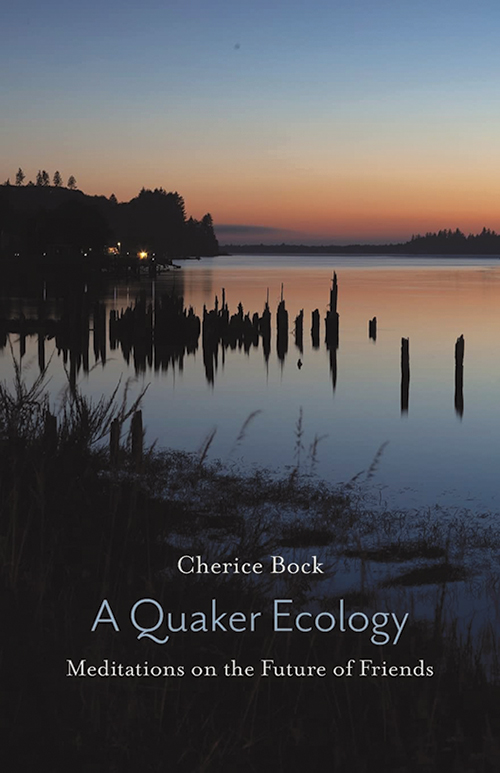
A Quaker Ecology: Meditations on the Future of Friends
Reviewed by Lauren Brownlee
March 1, 2024
By Cherice Bock. Barclay Press, 2022. 114 pages. $17/paperback; $4/eBook.
A Quaker Ecology: Meditations on the Future of Friends by Cherice Bock is an expansion of Bock’s Bible Half-Hour series at New England Yearly Meeting’s annual sessions in 2020. Bock’s reflections invite readers to consider the connections between the spiritual, social, economic, and ecological aspects of biblical messages and our own lives. The book asks the question: “Are our traditional ways of being Quaker worth renewing, or are they too much a product of European American white supremacy, colonialism, and the ideology of power-over that comes with this worldview?”
The book introduces the concept of eco-reformation, “an expansion and a breaking open of our vision, a new imaginative landscape in which we can move and grow and hope and transform,” and it explores “an ecotheology of Light that connects us all as participants in the community of all life.” Additionally, Bock shares the dimensions of “watershed discipleship”: “(1) recognition of the watershed moment of ecological crisis in which we find ourselves, (2) being disciples within our geographical region or watershed, and (3) being disciples of the other creatures and landscape elements around us in our watershed.” Overall, the book invites readers to consider how we might best live in right relationship with Spirit, people, and the Earth.
Bock’s invitation to ecotheology is grounded in the idea that all liberation of people and planet is connected. Bock encourages readers to step away from our false binaries and hierarchies as they relate to societies and species. She notes that humans are an interdependent species, even at the cellular level, as an estimated 90 percent of the cells in human bodies are bacteria (notably, approximately 40,000 different bacteria species!). And so our bodies house communities just as we are a part of many overlapping circles of community: our families, faith communities, local communities, and a global community. Bock encourages: “Friends, if we are to continue into the Eco-Reformation, it requires us to think of ourselves and act like a body that values each one and that connects us directly to the body of God.” This kind of Spirit-led wisdom fills the book.
My favorite chapter was “Incarnation and a Quaker Ecotheology of Light.” Many Friends find inspiration in the role that Light plays in our spirituality. Bock believes that deepening our understanding of the Light can be an important step toward embracing an eco-reformation. She writes, “By expanding our understanding of the Light from one of personal experience to an ecosystem model, where the Light connects us to all other life, we become participants in the co-labor of life-making.” Bock believes that Light is a resource for our recognizing (bio)diversity and creativity, and shares that discomfort can lead us to remember that “cracks are where the Light gets in.” Bock illustrates that answering that of God, or the Light, within all that we encounter is a way we can live into our Quaker testimonies.
I want to be a part of the future that Bock envisions for Friends. She encourages Quakers to move “from our tendency as a Society of Friends in the United States to get caught up in systems that perpetuate white supremacy and ecological degradation, toward participation in the community of all life.” She believes that we are on the way toward this future based on our beginning to tell a fuller version of Quaker history in which we recognize the moments when we fell short of our shared values. Bock shares that both John Woolman and Martin Luther King Jr. spoke to the power of being extremists for love, and I’m encouraged by the fact that Friends Committee on National Legislation has recently articulated “radically love” as one of the core values guiding its work. I am grateful to be a part of a faith community that embraces continuing revelation and can evolve the expressions of our faith to meet the needs of our time. Bock’s road map for the potential next steps for Friends is one that I believe to be a worthy touchstone for Quaker communities.
Lauren Brownlee is a member of Bethesda (Md.) Meeting, where she serves on the Ministry and Worship and Peace and Social Justice Committees. She also serves as deputy general secretary for Friends Committee on National Legislation.



Comments on Friendsjournal.org may be used in the Forum of the print magazine and may be edited for length and clarity.